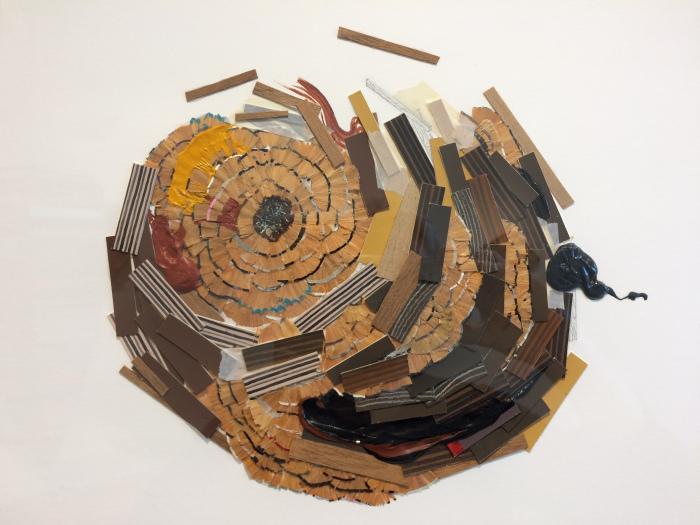Andre Yi “Obliterate”
Open Mind Art Space
Through October 26, 2018
by Jody Zellen
Before turning to sculpture, Andre Yi created delicate paintings and drawings. His early works were detailed renderings of natural and architectural elements centered in large expanses of soft color, often juxtaposed with swirling ribbon shaped white lines that suggested flowing rivers. In later paintings such as Untitled (Ginko Tree), 2008 the green tree leaves are depicted as hard edged rectangles. Imagining a progression, it is possible to see the trajectory from Yi’s paintings which were becoming more abstracted while remaining two-dimensional, to his current constructions. It is as if the trees and the background disappeared leaving just the geometric shapes.
In his current works, the canvas is gone but the geometry remains. The six wall based sculptures on view in Obliterate are quasi-honeycomb shaped constructions, crafted from disparate pieces of painted wood. Assembly (no. 9), 2018 for example, is both flat and dimensional at the same time. Wooden slats (some solid colors, other painted with concentric lines that resemble patterns of woodgrain) of varying sizes and thicknesses have been combined into irregular polygons that proliferate from the center as Yi ads more elements to the structure. In each of the Assembly works, Yi interlocks these wooden shapes to create a formally appealing balance of color and design. Sometimes, Yi wraps a portion of the wood with colored string or covers it with the fan-shaped remains from sharpening pencils to create another texture. Illusionistically the constructions recede into the wall creating a sense of vertigo as if one was looking down into an endless mind shaft.
A single floor based sculpture complements the works on the walls. Standing approximately six feet high, Stack, 2017 is a spiraling tornado shaped sculpture emanating from a rectangular plywood base with a white top. Built from shards of painted wood that grow up and outwards exponentially before tapering at the top, the towering form begs to be viewed from all sides. Each angle presents a different combination of colors and shapes that ebb and flow. Though seemingly unbalanced, the sculpture is perfectly aligned.
While Yi’s sculptures have a commanding presence, his collages on paper have a subtle intrigue. These modest sized pieces allude to biomorphic and organic forms, suggesting snails shells and other animals. Mostly brown in tone, they consist of pencil shavings, dabs of paint and torn fragments of painted paper assembled together into nest-like arrays. Construction (no. 2), 2015 has the feel of a tumbleweed cascading across the road whereas Construction (no. 4), 2015 could be interpreted as an animal on the run and Construction (no. 3), 2015, evokes a crawling crab.
To obliterate is to destroy, or to cause to become invisible. It is a curious and aggressive title for a show of carefully constructed pieces. What in fact Yi has obliterated is his past works. He has rendered his painted world invisible in favor of fragmented constructions that call to mind natural and built environs simultaneously. While Yi might be referencing the cyclical aspects of creation— that constructing something new often necessitates destroying the old— the works are not accusatory. Rather, they are celebrations of the possibilities of seeing things anew.
Open Mind Art Space
11631 Santa Monica Boulevard
Los Angeles, California 90025
Hours: Tuesdays – Saturdays: 11am – 6pm
Or by appointment
http://openmindartspace.com
